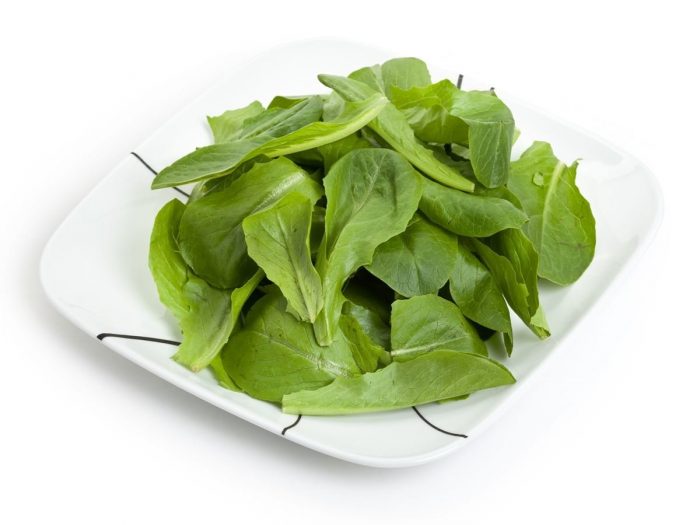Nutritional Value Of Spinach
 The various health benefits of spinach are due to the presence of minerals, vitamins, pigments and phytonutrients, including potassium, manganese, zinc, magnesium, iron and calcium. Spinach is a green vegetable which has a very wide distribution. It can be grown as a back yard crop or bought from the market at affordable prices. It is a source of vitamins like folate, niacin, vitamin A, vitamin B6, vitamin C and traces of the rest of the essential vitamins. Other important elements, including thiamine and riboflavin, which are used in various reactions in our body, are also found in spinach. Spinach is also rich in pigments like beta carotene, lutein, xanthene, and chlorophyllin. The best part is that spinach has a low fat content. Spinach offers a wide range of benefits to most of our physiological processes, whether consumed in raw or cooked form.
The various health benefits of spinach are due to the presence of minerals, vitamins, pigments and phytonutrients, including potassium, manganese, zinc, magnesium, iron and calcium. Spinach is a green vegetable which has a very wide distribution. It can be grown as a back yard crop or bought from the market at affordable prices. It is a source of vitamins like folate, niacin, vitamin A, vitamin B6, vitamin C and traces of the rest of the essential vitamins. Other important elements, including thiamine and riboflavin, which are used in various reactions in our body, are also found in spinach. Spinach is also rich in pigments like beta carotene, lutein, xanthene, and chlorophyllin. The best part is that spinach has a low fat content. Spinach offers a wide range of benefits to most of our physiological processes, whether consumed in raw or cooked form.
Anti-Ulcerative
It has been found that spinach and some other vegetables have the ability to protect the mucous membrane of the stomach, thereby decreasing the occurrence of gastric ulcers. Furthermore, the glycocyclerolipids found in spinach can boost the strength of the digestive tract lining, thereby preventing any unwanted inflammation in that part of the body that can cause harm.
The various health benefits of spinach are due to the presence of minerals, vitamins, pigments and phytonutrients, including potassium, manganese, zinc, magnesium, iron and calcium. Spinach is a green vegetable which has a very wide distribution. It can be grown as a back yard crop or bought from the market at affordable prices. It is a source of vitamins like folate, niacin, vitamin A, vitamin B6, vitamin C and traces of the rest of the essential vitamins. Other important elements, including thiamine and riboflavin, which are used in various reactions in our body, are also found in spinach. Spinach is also rich in pigments like beta carotene, lutein, xanthene, and chlorophyllin. The best part is that spinach has a low fat content. Spinach offers a wide range of benefits to most of our physiological processes, whether consumed in raw or cooked form.
It has been found that spinach and some other vegetables have the ability to protect the mucous membrane of the stomach, thereby decreasing the occurrence of gastric ulcers. Furthermore, the glycocyclerolipids found in spinach can boost the strength of the digestive tract lining, thereby preventing any unwanted inflammation in that part of the body that can cause harm.
Outstanding Broad-Based Nourishment
| Magnesium | Mineral | 1st | Excellent |
| Iron | Mineral | 1st | Excellent |
| Vitamin B2 | Water-Soluble Vitamin | 2nd | Excellent |
| Vitamin B6 | Water-Soluble Vitamin | 2nd | Excellent |
| Vitamin K | Fat-Soluble Vitamin | 2nd | Excellent |
| Vitamin E | Fat-Soluble Vitamin | 2nd | Excellent |
| Vitamin A | Fat-Soluble Vitamin | 2nd | Excellent |
| Folate | Water-Soluble Vitamin | 3rd | Excellent |
| Calcium | Mineral | 3rd | Excellent |
| Potassium | Mineral | 3rd | Excellent |
| Manganese | Excellent | ||
| Copper | Mineral | A | llent |
Spinach also serves as a very good source of fiber, phosphorus, vitamin B1, zinc, protein, and choline, and as a good source of omega-3 fatty acids, vitamin B3, pantothenic acid, and selenium.
Spinach, cooked
1.00 cup
1.00 cup
vitamin K987%
vitamin A105%
manganese84%
folate66%
magnesium39%
iron36%
copper34%
vitamin B232%
vitamin B626%
vitamin E25%
calcium24%
vitamin C24%
potassium24%
fiber17%
vitamin B114%
phosphorus14%
zinc12%
protein11%
choline8%
selenium5%